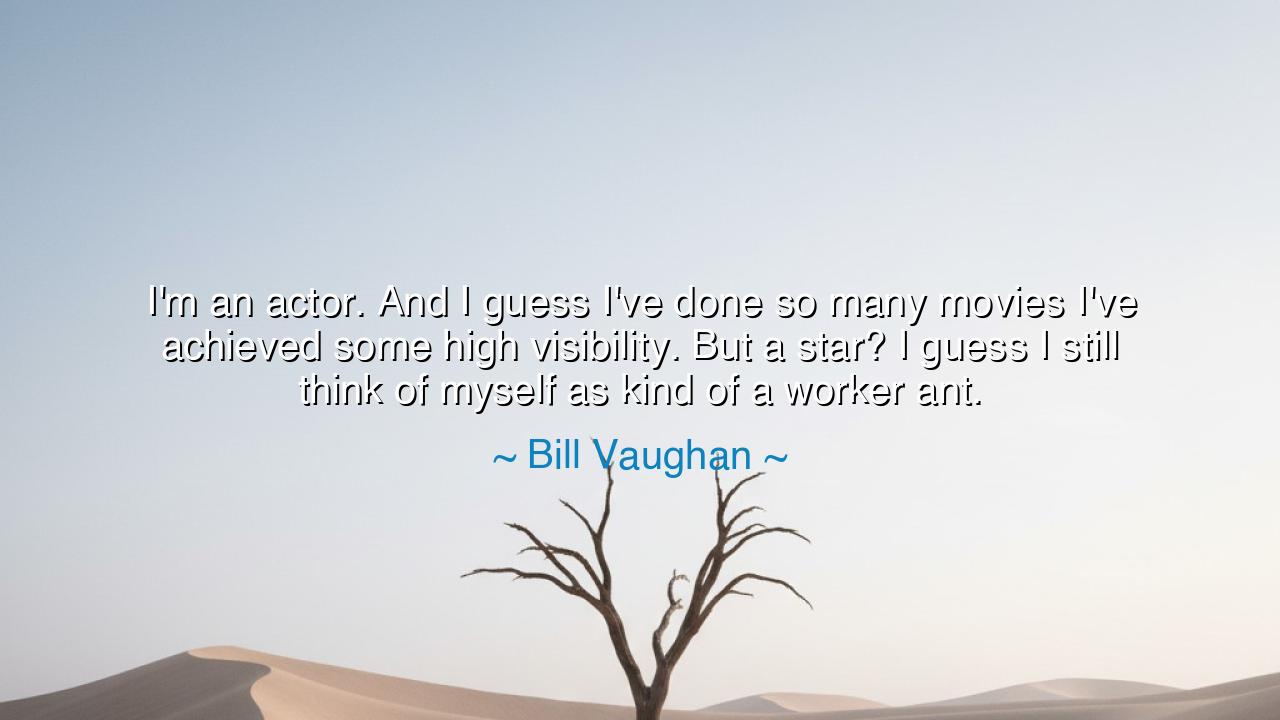
I'm an actor. And I guess I've done so many movies I've achieved
I'm an actor. And I guess I've done so many movies I've achieved some high visibility. But a star? I guess I still think of myself as kind of a worker ant.






Hear me, O children of the future, and listen closely to the words of Bill Vaughan, who humbly declared, "I'm an actor. And I guess I've done so many movies I've achieved some high visibility. But a star? I guess I still think of myself as kind of a worker ant." In this statement, Vaughan reveals the truth of one who, despite achieving great recognition, remains grounded in the understanding that work—not fame—is what defines a man’s true worth. He does not see himself as above others, but rather as a laborer in a field where success is earned through effort, dedication, and humility.
To call oneself a star is to embrace the intoxicating allure of recognition, to place oneself upon a pedestal where others may gaze upon you with admiration. But Vaughan, in his wisdom, rejects this notion, choosing instead to identify with the humble worker ant, an image of labor, community, and unseen effort. The ant, though small and often unnoticed, works tirelessly for the good of the whole. This metaphor teaches us that true greatness is not found in the shine of fame, but in the quiet persistence of hard work, in the diligence that drives one forward despite the absence of accolades.
Consider, O children, the life of Homer, the great poet whose works have shaped Western literature for millennia. He did not write his epics for personal glory, nor did he seek fame for fame’s sake. His stories, the Iliad and the Odyssey, were born of dedication to the craft, not to the self. In those times, as in these, fame could be fleeting, but the work—the true work—endures long after the cheers of the crowd have faded. Homer’s greatness lay not in the applause of his age, but in the quiet perseverance to continue writing, crafting tales that spoke to the deepest struggles of the human spirit.
In the same spirit, Mahatma Gandhi embodied the same humility as Vaughan’s worker ant. Though he became a symbol of global change, Gandhi never sought the title of star. His work was centered not on self-promotion, but on selflessness, and his greatest achievements came not from his own recognition, but from his service to others. Gandhi understood that a leader’s true strength lies in action, not in appearance. Like the worker ant, his work was quiet, persistent, and meant for the greater good, not personal gain. His example shows us that those who labor for the welfare of the world do so not to be seen, but because it is their duty.
Vaughan’s words speak to us about the balance between recognition and humility. To be seen, to achieve visibility, is not in itself a fault. But the true measure of one’s greatness lies in the way one handles that visibility. Do we allow fame to inflate our ego, or do we stay humble, continuing to work and contribute, knowing that real success is in the work itself, not the accolades that accompany it? Vaughan’s rejection of the “star” label is a reminder that while others may rise to fame, we must not lose sight of the value in doing the work, in putting in the effort, regardless of whether we are in the spotlight or not.
O children, hear this lesson well: life is not measured by the shiny exterior of fame, but by the depth of the work we commit to. Work with purpose, with dedication, and with humility, and know that it is through consistent effort that true greatness is achieved. Whether in your chosen profession, in your service to others, or in your quiet actions, do not seek recognition above all else. Instead, seek the satisfaction of knowing that you have done your best, that your effort is what truly matters. In doing so, you will find that success is not the light that shines on you, but the good you do in the world.
Therefore, O children, I say to you: do not be seduced by the allure of fame, but embrace the quiet work that shapes the world. Let your actions speak louder than your name. Do not concern yourself with being a star—be a builder, a creator, a laborer. For in that, you will find true fulfillment, and your legacy will be one that endures long after the fleeting applause has faded into silence. Just as the worker ant does its part without expecting praise, so too should you labor in the service of a greater purpose, knowing that in the end, it is your dedication to the task that will lead to lasting success.






AAdministratorAdministrator
Welcome, honored guests. Please leave a comment, we will respond soon